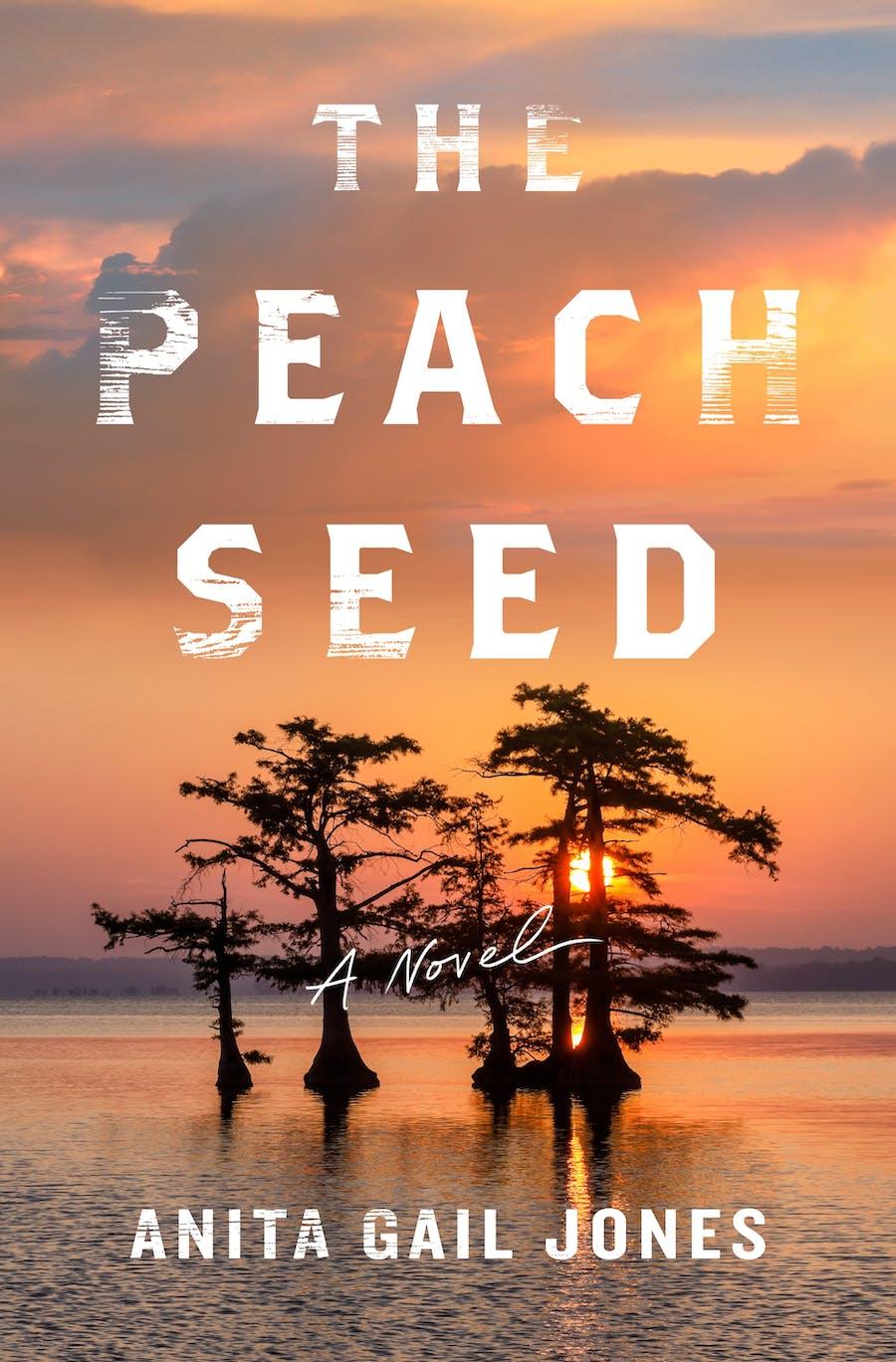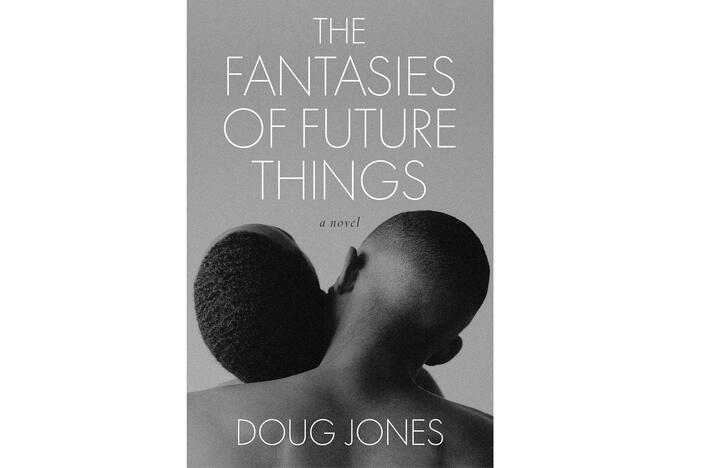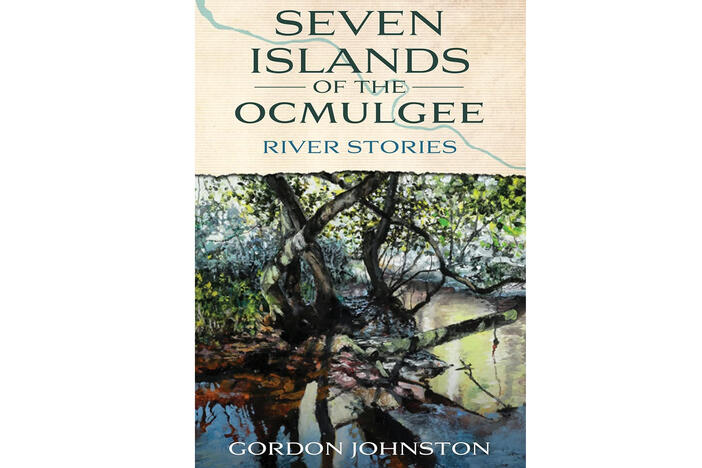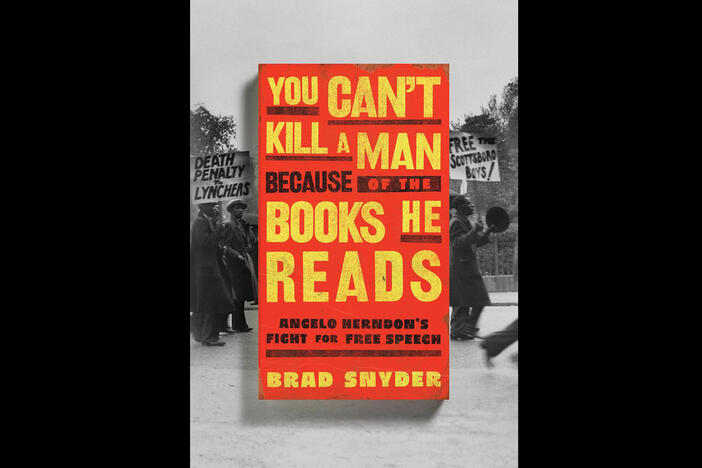
Section Branding
Header Content
Anita Gail Jones: The Peach Seed
Primary Content
An indelible portrait of a family, The Peach Seed explores how kin pass down legacies of sorrow, joy, and strength. And it is a parable of how a glimmer of hope as small as a seed can ripple across generations. Peter and Orlando explore a conversation with author Anita Gail Jones and learn about the Civil Rights movement in Albany, GA along the way.

Orlando Montoya: Coming up in this episode.
Peter Biello: I do appreciate that they're complicated, interesting people who you can really sort of get attached to and hope for the best for.
Anita Gail Jones: And hopefully they will read with an open mind and open heart and open up to something they had not thought about.
Orlando Montoya: When you're talking about history and you're talking about Albany, you're talking about the civil rights era?
Peter Biello: The Albany Movement, which is not something I knew about before I read this book.
Orlando Montoya: This podcast from Georgia Public Broadcasting highlights books with Georgia Connections hosted by two of your favorite public radio book nerds, who also happen to be your hosts of All Things Considered on GPB Radio. I'm Orlando Montoya.
Peter Biello: And I'm Peter Biello. Thanks for joining us as we introduce you to authors, their writings, and the insights behind the stories mixed with our own thoughts and ideas on just what gives these works the Narrative Edge.
Orlando Montoya: All right. Hey Peter, what book are we talking about today?
Peter Biello: Today we're talking about The Peach Seed, a debut novel by Anita Gail Jones. Jones lives in California now, but she's she's been there since 1985. But she grew up in Albany, Georgia, in the southwest corner of the state. That's where most of the events of this novel happen, southwest Georgia.
Orlando Montoya: So we're talking about The Peach Seed, isn't it normally called the peach pit?
Peter Biello: I thought so, too. But I mean, it sounds better to say seed, right, rather than peach pit, you know? But there is a seed inside the hard, almost wooden pit, which is the part that's great for carving. And I didn't know until reading this book that it's actually a thing to to carve these dried peach pits into objects. There are a lot of peach monkeys out there. If you Google peach pit carving, the first thing that pops up are these little monkeys that, you know, monkey kind of curling around and holding its tail. And in this book, it's referred to as the Peach Seed Monkey.
Orlando Montoya: I can't even picture a seed being turned into art, but.
Peter Biello: The very small knives and carvers, I suppose. But yeah, my fingers would be way too clumsy for something like this. But they're cool. Google it. You got to see these things.
Orlando Montoya: So Peach Seed is the title. What role does this peach seed monkey play?
Peter Biello: Okay. The crux of the story is the peach seed monkey is this little carving that gets passed down to boys in the Duke's family. When they turn 13, the main character we follow in this book is Fletcher Dukes, who's a widower. Let me back up a moment to say that novelists sometimes let ideas percolate for kind of a long time before they start writing. And Jones was thinking a lot about manhood and leadership, particularly in black families like hers and in Deep South communities like the one she grew up in, in Albany. And that's what she was thinking about when she was considering this project.
Anita Gail Jones: When I started figuring out what the book would be about and who would be in it, the little monkey just jumped in. He just jumped in and said, "I want to be in this story." And it was up to me, of course, to figure out how to make him fit. So I invented the tradition that the men in the Dukes family carved these little monkeys, and they they give them to the young boys. When they come of age 13, they receive their peach seed monkey along with the catch phrase, This will keep the monkey off your back because being a man is more than a notion. And he becomes the thread that just pulls you through the story.
Orlando Montoya: So the peach seed becomes the thread in the story. How does that work?
Peter Biello: Well, there are a few threads here. I mentioned Fletcher Dukes. He's the patriarch of this family. His wife died a few years back. He's living alone when the novel starts. He spends a lot of time with his sister, and one day he's out of the grocery store with his sister and he sees all Altovise, the woman he proposed to when he was a young man. This is like almost 50 years before the novel begins. Altovise said no to his proposal and then promptly moved to Michigan. He never sees her again. She goes on to have a successful music career. She puts out records. Fletcher buys them as he moves on with his life. You know, he basically she basically disappears from his life. He gets married to someone else, has a few daughters, has a whole life without Altovise, except for her music, of course.
Orlando Montoya: So Altovise comes back and rocks the boat a little bit.
Peter Biello: Yeah. I mean, this is how I think of stories sometimes. Maybe this is a bit reductive, but, you know, there are two kinds of stories. There's the hero goes on a journey kind of story, and then there's the stranger comes to town story. And this is one of the stranger comes to town varieties, right? Altovise comes back and just disrupts this peace that that Fletcher Dukes has been enjoying more or less for his whole life. Here she is, the one that got away. And he's got a whole lifetime of experiences that would have been different had she said yes 50 years ago. And now here she is. And he's got to like process that and think about it.
Anita Gail Jones: And it's the story that a lot of people gravitate to. That's when for a long time, my main pitch for the book, I centered it around that that piece about Altovise being away for 50 years and then she comes back and people say, "Oh, do they get back together?" It's like, I don't know, you got to read the books. So but just exploring that from a human point of view, a universal human point of view, it's devastating. And then when you learn when when you learn that this person is back, of course, she's got a lot of baggage she's brought with her. And then you're also of a certain age now, you're not going to react to this as you would have when you were in your 40s and someone came back after 20 years or whatever. So that was that was foremost in my mind, was always keeping to how would these folks act at almost being they're almost 70. They're 69 years old. So I had to try to put myself in that position. Of course, now I'm closer to their age because it took forever to write the book, but...Ten plus years to write it. So as I'm writing it, I'm getting closer and closer to the age that they are. And that made it a little easier. But I this really walked a mile in his shoes and just tried to imagine what if.
Orlando Montoya: So do they get back together?
Peter Biello: I would answer that, Orlando, but I'm going to hold off because it's not.
Orlando Montoya: That's the central question in the book?
Peter Biello: It well, it's one of the questions. But there's an there's actually an even more interesting question raised by another thread in this story. And this thread is about the character of Simon.
Orlando Montoya: Simon. Who's that?
Peter Biello: Okay. Before I answer that, I just want to say that this is kind of a spoiler. No, not a super big spoiler, but kind of one. So I should say for me, I don't care about spoilers. I'll have a book spoiled any day of the week. That's not what it's about for me. I kind of like knowing the end sometimes, but I know some people don't like that. So if you absolutely hate anything that carries even the slightest whiff of a spoiler. Skip this part. I don't think it's much of a spoiler and I'll explain why, but now's a good time for the anti spoiler crowd to maybe hit the advanc 30 seconds button on your podcast player of choice. Maybe hit it twice. Okay. Simon is a man born in Michigan shortly after Altovise left Georgia and who was adopted and therefore doesn't know his birth parents. His adoptive parents died, and all he has from his parents is a peach seed monkey that his birth mother said should be given to him on his 13th birthday. And who do we know who carves peach seed monkeys?
Orlando Montoya: Fletcher.
Peter Biello: Fletcher Dukes. And in this book, Fletcher proposes to Altovise not with a ring, but with.
Orlando Montoya: A peach seed monkey.
Peter Biello: Exactly. So as a reader, within about the first third of the book, you can kind of figure out that Simon is Fletcher's son. Altovise was pregnant when she declined his proposal, but she moved to Michigan and gave up the baby for adoption. Because you figured that out so early. And it's so obvious. In my view, it's not much of a spoiler. But as the novel progresses and Fletcher and Altovise reconnect, what hangs in the balance is not necessarily will they get together.
Orlando Montoya: How it's going to happen.
Peter Biello: Yeah, how it's going to happen, What's going to happen when Altovise tells Fletcher that she gave up his son for adoption so many years ago. He's had daughters, right? He didn't know he had a son. He never had a son. He knew to give a peach seed monkey, too. So that was the at least for me, right? That was the question that pulled me through this narrative towards the end. What's going to happen when this comes out between the two of them and how are they going to survive?
Orlando Montoya: This sounds like a story that could only take place in a smaller town.
Peter Biello: Yeah, to some extent, yeah. Especially with so many questions about, you know, leadership and legacy in this small, small town, in this black community as well. This family, the Dukes family, is kind of how Anita Gail Jones makes manifest all these questions she has about leadership and and history. There's more history we're going to get to in a minute. So, yeah, Albany really does matter a lot in this particular novel.
Orlando Montoya: When you're talking about history and you're talking about Albany, you're talking about the civil rights era?
Peter Biello: The Albany Movement, which is not something I knew about before I read this book. You know, you know about the civil rights movement. You know, it was happening in the South. There was a part of it that took place in Albany and Fletcher and Altovise when they were dating around when they were around 20, they were marching in protests. And all of this was arrested. And, you know, they attended trainings where the, you know, the male protestors were supposed to protect the women protesters. And I asked Jones to tell us a little bit more about what happened in Albany during the civil rights movement.
Anita Gail Jones: The movement started with the late Charles Sherrod, who was a field secretary in the 60s. He came to Albany to work on voter registration and to work on civil rights. And he never left. He passed away last year. I think it's been about a year. In October, he passed away. And he did a lot of work to register people to vote. And there was a lot of that going on. That was a main focus. And and then people were being organized to make some changes to many things that were happening in Albany. And Dr. King came down from Atlanta to help with the with the movement. And he had a definite plan that later on he would identify as being too broad, that it needed to have a narrower, more narrow focus. And this is why the movement went down into history as being a failure. And it was absolutely not a failure, of course. And people on the ground kept working after King left, and they have never stopped working.
Peter Biello: So when I spoke to Anita Gail Jones about this particular part of the novel and about Albany's role in the civil rights movement, we we I asked, was it kind of a laboratory for methods of protest during the civil rights movement. And she she said that was a good way to describe it. But I had never heard about the Albany Movement or if I had, I'd forgotten. You've lived in Georgia longer than I have Orlando. Is this a thing people know about in Georgia?
Orlando Montoya: I yeah, I've been here in Georgia for 24, 25 years. So yeah, I knew about the Albany Movement, not like all the details. I have visited Albany, been to the Civil Rights Museum there. And I think last year Sherrod died, did he not?
Peter Biello: That yeah, that's what she was saying, that that he died about a year ago.
Orlando Montoya: And yeah, we did a story about that so I remember that.
Peter Biello: okay. Well, I suppose Fletcher and Altovise could have met any number of ways. But to me, as they're protesting, a movement pushing for racial equality really ties into that theme of black strength and resilience and leadership, which is most directly related to another thread in this book. There are a lot of threads. There are few sections in this book that start in Senegal in the 1700s and follow a character named Malik as he is abducted into slavery.
Orlando Montoya: That goes way back.
Peter Biello: It goes way back, right? She's she's really sort of using that author's privilege here to to direct your attention to the this family. Because we eventually learn that Malik is an ancestor of Fletcher and, of course, something Malik holds on to in his pocket and has special meaning to him.
Orlando Montoya: A peach seed.
Peter Biello: A peach seed. So I asked Jones what she was hoping to accomplish by including Malik's ancestral story.
Anita Gail Jones: As I wrote it. As I wrote the ancestral story, I thought, Boy, I wish I could tell Fletcher that I know his people. I know who they are. Ofcourse, I'm also inventing them. But I also wanted that for the reader. I wanted them to feel I have some insight into this family that they could never have. Boy, I wish I could tell them. And I feel that that fiction has a beautiful opportunity for people to meet someone they might never meet and go right inside that person's head and see what makes them tick. So someone total opposite of Fletcher Duke's gets to know him, a black man in the South. And hopefully they will read with an open mind and open heart and open up to something they had not thought about.
Orlando Montoya: So what do you think gives this book the Narrative Edge?
Peter Biello: What gives this book the Narrative Edge, I think, is how a book like this could have easily been a heavy handed lecture. This book is not a vehicle for Jones' thoughts on slavery or how the civil rights movement went down in Albany. She keeps it very human, even though it's also very consciously trying to show how trauma is passed from generation to generation. In this case, the trauma of being kidnaped, forced into slavery and living under the oppressive thumb of white society. She's conveying all of that without losing sight of Fletcher and Altovise and some of the drama I haven't even gone into with Fletcher's grandson. It's complicated. They're interesting people. And that's the bottom line, I think, and I do appreciate that they're complicated, interesting people who you can really sort of get attached to and hope for the best for.
Orlando Montoya: Well, I'm up for a love story.
Peter Biello: It's it's one of those love stories you don't see too often, right?
Orlando Montoya: Sounds fascinating.
Peter Biello: Yeah. Yeah.
Orlando Montoya: Sounds fascinating. The book is The Peach Seed by Anita Gail Jones. Peter, thanks for telling us about it.
Peter Biello: Always fun to chat with you about books, Orlando.
Orlando Montoya:
Thanks for listening to Narrative Edge. We'll be back in two weeks with a brand-new episode. This podcast is a production of Georgia Public Broadcasting. Find us online at GPB.org/NarrativeEdge.
Peter Biello: You can also catch us on the daily GPB News podcast Georgia Today for a concise update on the latest news in Georgia. For more on that and all of our podcasts, go to GPB.org/Podcasts.
An indelible portrait of a family, The Peach Seed explores how kin pass down legacies of sorrow, joy, and strength. And it is a parable of how a glimmer of hope as small as a seed can ripple across generations. Peter and Orlando explore a conversation with author Anita Gail Jones and learn about the Civil Rights movement in Albany, GA along the way.







